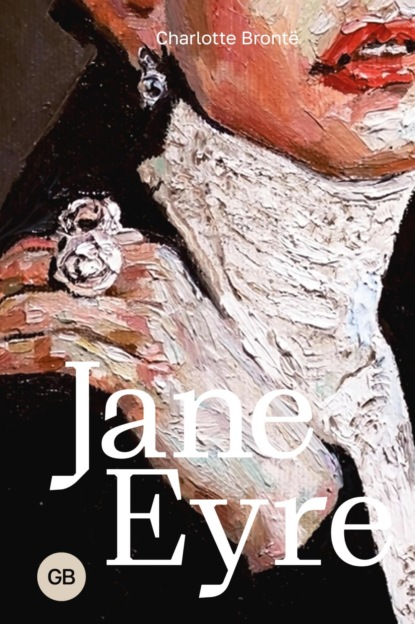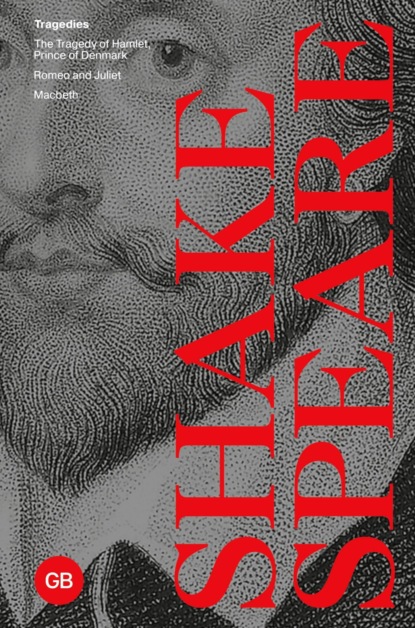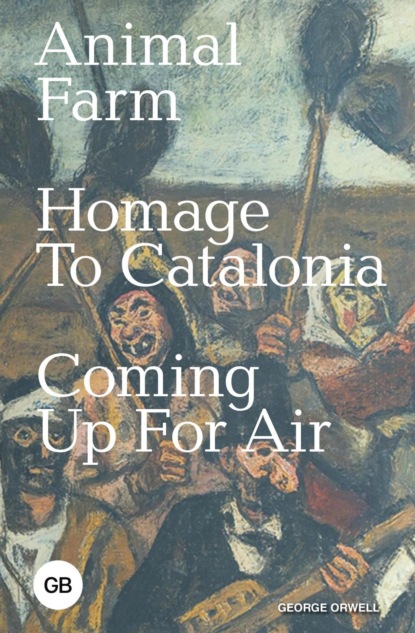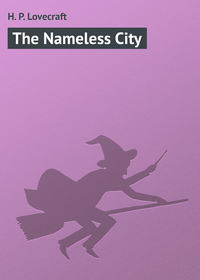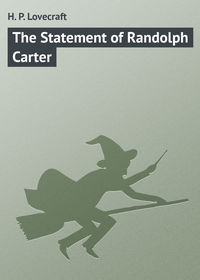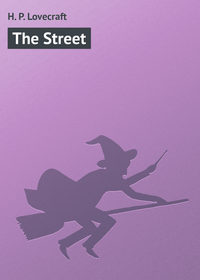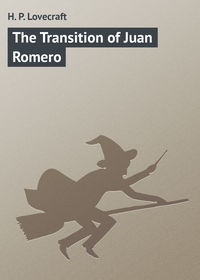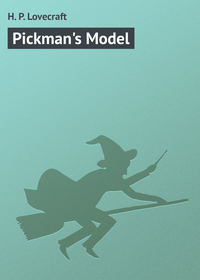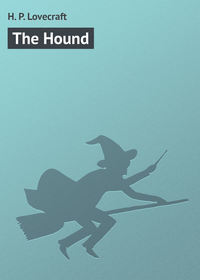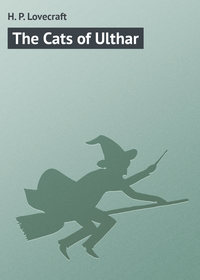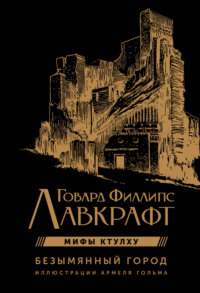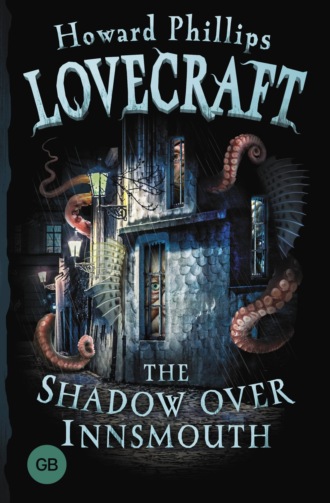
Полная версия
The Shadow over Innsmouth / Морок над Инсмутом
North of the river there were traces of squalid life – active fish-packing houses in Water Street, smoking chimneys and patched roofs here and there, occasional sounds from indeterminate sources, and infrequent shambling forms in the dismal streets and unpaved lanes – but I seemed to find this even more oppressive than the southerly desertion. For one thing, the people were more hideous and abnormal than those near the centre of the town; so that I was several times evilly reminded of something utterly fantastic which I could not quite place. Undoubtedly the alien strain in the Innsmouth folk was stronger here than farther inland – unless, indeed, the “Innsmouth look” were a disease rather than a blood strain, in which case this district might be held to harbour the more advanced cases.
One detail that annoyed me was the distribution of the few faint sounds I heard. They ought naturally to have come wholly from the visibly inhabited houses, yet in reality were often strongest inside the most rigidly boarded-up facades. There were creakings, scurryings, and hoarse doubtful noises; and I thought uncomfortably about the hidden tunnels suggested by the grocery boy. Suddenly I found myself wondering what the voices of those denizens would be like. I had heard no speech so far in this quarter, and was unaccountably anxious not to do so.
Pausing only long enough to look at two fine but ruinous old churches at Main and Church Streets, I hastened out of that vile waterfront slum. My next logical goal was New Church Green, but somehow or other I could not bear to repass the church in whose basement I had glimpsed the inexplicably frightening form of that strangely diademed priest or pastor. Besides, the grocery youth had told me that the churches, as well as the Order of Dagon Hall, were not advisable neighbourhoods for strangers.
Accordingly I kept north along Main to Martin, then turning inland, crossing Federal Street safely north of the Green, and entering the decayed patrician neighbourhood of northern Broad, Washington, Lafayette, and Adams Streets. Though these stately old avenues were ill-surfaced and unkempt, their elm-shaded dignity had not entirely departed. Mansion after mansion claimed my gaze, most of them decrepit and boarded up amidst neglected grounds, but one or two in each street shewing signs of occupancy. In Washington Street there was a row of four or five in excellent repair and with finely tended lawns and gardens. The most sumptuous of these – with wide terraced parterres extending back the whole way to Lafayette Street – I took to be the home of Old Man Marsh, the afflicted refinery owner.
In all these streets no living thing was visible, and I wondered at the complete absense of cats and dogs from Innsmouth. Another thing which puzzled and disturbed me, even in some of the best-preserved mansions, was the tightly shuttered condition of many third-story and attic windows. Furtiveness and secretiveness seemed universal in this hushed city of alienage and death, and I could not escape the sensation of being watched from ambush on every hand by sly, staring eyes that never shut.
I shivered as the cracked stroke of three sounded from a belfry on my left. Too well did I recall the squat church from which those notes came. Following Washington Street toward the river, I now faced a new zone of former industry and commerce; noting the ruins of a factory ahead, and seeing others, with the traces of an old railway station and covered railway bridge beyond, up the gorge on my right.
The uncertain bridge now before me was posted with a warning sign, but I took the risk and crossed again to the south bank where traces of life reappeared. Furtive, shambling creatures stared cryptically in my direction, and more normal faces eyed me coldly and curiously. Innsmouth was rapidly becoming intolerable, and I turned down Paine Street toward the Square in the hope of getting some vehicle to take me to Arkham before the still-distant starting-time of that sinister bus.
It was then that I saw the tumbledown fire station on my left, and noticed the red-faced, bushy-bearded, watery-eyed old man in nondescript rags who sat on a bench in front of it talking with a pair of unkempt but not abnormal-looking firemen. This, of course, must be Zadok Allen, the half-crazed, liquorish nonagenarian whose tales of old Innsmouth and its shadow were so hideous and incredible.
III
It must have been some imp of the perverse – or some sardonic pull from dark, hidden sources – which made me change my plans as I did. I had long before resolved to limit my observations to architecture alone, and I was even then hurrying toward the Square in an effort to get quick transportation out of this festering city of death and decay; but the sight of old Zadok Allen set up new currents in my mind and made me slacken my pace uncertainly.
I had been assured that the old man could do nothing but hint at wild, disjointed, and incredible legends, and I had been warned that the natives made it unsafe to be seen talking to him; yet the thought of this aged witness to the town’s decay, with memories going back to the early days of ships and factories, was a lure that no amount of reason could make me resist. After all, the strangest and maddest of myths are often merely symbols or allegories based upon truth – and old Zadok must have seen everything which went on around Innsmouth for the last ninety years. Curiosity flared up beyond sense and caution, and in my youthful egotism I fancied I might be able to sift a nucleus of real history from the confused, extravagant outpouring I would probably extract with the aid of raw whiskey.
I knew that I could not accost him then and there, for the firemen would surely notice and object. Instead, I reflected, I would prepare by getting some bootleg liquor at a place where the grocery boy had told me it was plentiful. Then I would loaf near the fire station in apparent casualness, and fall in with old Zadok after he had started on one of his frequent rambles. The youth said that he was very restless, seldom sitting around the station for more than an hour or two at a time.
A quart bottle of whiskey was easily, though not cheaply, obtained in the rear of a dingy variety-store just off the Square in Eliot Street. The dirty-looking fellow who waited on me had a touch of the staring “Innsmouth look”, but was quite civil in his way; being perhaps used to the custom of such convivial strangers – truckmen, gold-buyers, and the like – as were occasionally in town.
Reëntering the Square I saw that luck was with me; for – shuffling out of Paine Street around the corner of the Gilman House – I glimpsed nothing less than the tall, lean, tattered form of old Zadok Allen himself. In accordance with my plan, I attracted his attention by brandishing my newly purchased bottle; and soon realised that he had begun to shuffle wistfully after me as I turned into Waite Street on my way to the most deserted region I could think of.
I was steering my course by the map the grocery boy had prepared, and was aiming for the wholly abandoned stretch of southern waterfront which I had previously visited. The only people in sight there had been the fishermen on the distant breakwater; and by going a few squares south I could get beyond the range of these, finding a pair of seats on some abandoned wharf and being free to question old Zadok unobserved for an indefinite time. Before I reached Main Street I could hear a faint and wheezy “Hey, Mister!” behind me, and I presently allowed the old man to catch up and take copious pulls from the quart bottle.
I began putting out feelers as we walked along to Water Street and turned southward amidst the omnipresent desolation and crazily tilted ruins, but found that the aged tongue did not loosen as quickly as I had expected. At length I saw a grass-grown opening toward the sea between crumbling brick walls, with the weedy length of an earth-and-masonry wharf projecting beyond. Piles of moss-covered stones near the water promised tolerable seats, and the scene was sheltered from all possible view by a ruined warehouse on the north. Here, I thought, was the ideal place for a long secret colloquy; so I guided my companion down the lane and picked out spots to sit in among the mossy stones. The air of death and desertion was ghoulish, and the smell of fish almost insufferable; but I was resolved to let nothing deter me.
About four hours remained for conversation if I were to catch the eight o’clock coach for Arkham, and I began to dole out more liquor to the ancient tippler; meanwhile eating my own frugal lunch. In my donations I was careful not to overshoot the mark, for I did not wish Zadok’s vinous garrulousness to pass into a stupor. After an hour his furtive taciturnity shewed signs of disappearing, but much to my disappointment he still sidetracked my questions about Innsmouth and its shadow-haunted past. He would babble of current topics, revealing a wide acquaintance with newspapers and a great tendency to philosophise in a sententious village fashion.
Toward the end of the second hour I feared my quart of whiskey would not be enough to produce results, and was wondering whether I had better leave old Zadok and go back for more. Just then, however, chance made the opening which my questions had been unable to make; and the wheezing ancient’s rambling took a turn that caused me to lean forward and listen alertly. My back was toward the fishy-smelling sea, but he was facing it, and something or other had caused his wandering gaze to light on the low, distant line of Devil Reef, then shewing plainly and almost fascinatingly above the waves. The sight seemed to displease him, for he began a series of weak curses which ended in a confidential whisper and a knowing leer. He bent toward me, took hold of my coat lapel, and hissed out some hints that could not be mistaken.
“Thar’s whar it all begun – that cursed place of all wickedness whar the deep water starts. Gate o’ hell – sheer drop daown to a bottom no saoundin’-line kin tech. Ol’ Cap’n Obed done it – him that faound aout more’n was good fer him in the Saouth Sea islands.
“Everybody was in a bad way them days. Trade fallin’ off, mills losin’ business – even the new ones – an’ the best of our menfolks kilt a-privateerin’ in the War of 1812 or lost with the Elizy brig an’ the Ranger snow – both of ’em Gilman venters. Obed Marsh he had three ships afloat – brigantine Columby, brig Hetty, an’ barque Sumatry Queen. He was the only one as kep’ on with the East-Injy an’ Pacific trade, though Esdras Martin’s barkentine Malay Pride made a venter as late as ’twenty-eight.
“Never was nobody like Cap’n Obed – old limb o’ Satan! Heh, heh! I kin mind him a-tellin’ abaout furren parts, an’ callin’ all the folks stupid fer goin’ to Christian meetin’ an’ bearin’ their burdens meek an’ lowly. Says they’d orter git better gods like some o’ the folks in the Injies – gods as ud bring ’em good fishin’ in return for their sacrifices, an’ ud reely answer folks’s prayers.
“Matt Eliot, his fust mate, talked a lot, too, only he was agin’ folks’s doin’ any heathen things. Told abaout an island east of Otaheité whar they was a lot o’ stone ruins older’n anybody knew anything abaout, kind o’ like them on Ponape, in the Carolines, but with carvin’s of faces that looked like the big statues on Easter Island. They was a little volcanic island near thar, too, whar they was other ruins with diff’rent carvin’s – ruins all wore away like they’d ben under the sea onct, an’ with picters of awful monsters all over ’em.
“Wal, Sir, Matt he says the natives araound thar had all the fish they cud ketch, an’ sported bracelets an’ armlets an’ head rigs made aout of a queer kind o’ gold an’ covered with picters o’ monsters jest like the ones carved over the ruins on the little island – sorter fish-like frogs or frog-like fishes that was drawed in all kinds o’ positions like they was human bein’s. Nobody cud git aout o’ them whar they got all the stuff, an’ all the other natives wondered haow they managed to find fish in plenty even when the very next islands had lean pickin’s. Matt he got to wonderin’ too, an’ so did Cap’n Obed. Obed he notices, besides, that lots of the han’some young folks ud drop aout o’ sight fer good from year to year, an’ that they wa’n’t many old folks araound. Also, he thinks some of the folks looks durned queer even fer Kanakys.
“It took Obed to git the truth aout o’ them heathen. I dun’t know haow he done it, but he begun by tradin’ fer the gold-like things they wore. Ast ’em whar they come from, an’ ef they cud git more, an’ finally wormed the story aout o’ the old chief – Walakea, they called him. Nobody but Obed ud ever a believed the old yeller devil, but the Cap’n cud read folks like they was books. Heh, heh! Nobody never believes me naow when I tell ’em, an’ I dun’t s’pose you will, young feller – though come to look at ye, ye hev kind o’ got them sharp-readin’ eyes like Obed had.”
The old man’s whisper grew fainter, and I found myself shuddering at the terrible and sincere portentousness of his intonation, even though I knew his tale could be nothing but drunken phantasy.
“Wal, Sir, Obed he larnt that they’s things on this arth as most folks never heerd abaout – an’ wouldn’t believe ef they did hear. It seems these Kanakys was sacrificin’ heaps o’ their young men an’ maidens to some kind o’ god-things that lived under the sea, an’ gittin’ all kinds o’ favour in return. They met the things on the little islet with the queer ruins, an’ it seems them awful picters o’ frog-fish monsters was supposed to be picters o’ these things. Mebbe they was the kind o’ critters as got all the mermaid stories an’ sech started. They had all kinds o’ cities on the sea-bottom, an’ this island was heaved up from thar. Seems they was some of the things alive in the stone buildin’s when the island come up sudden to the surface. That’s haow the Kanakys got wind they was daown thar. Made sign-talk as soon as they got over bein’ skeert, an’ pieced up a bargain afore long.
“Them things liked human sacrifices. Had had ’em ages afore, but lost track o’ the upper world arter a time. What they done to the victims it ain’t fer me to say, an’ I guess Obed wa’n’t none too sharp abaout askin’. But it was all right with the heathens, because they’d ben havin’ a hard time an’ was desp’rate abaout everything. They give a sarten number o’ young folks to the sea-things twict every year – May-Eve an’ Hallowe’en – reg’lar as cud be. Also give some o’ the carved knick-knacks they made. What the things agreed to give in return was plenty o’ fish – they druv ’em in from all over the sea – an’ a few gold-like things naow an’ then.
“Wal, as I says, the natives met the things on the little volcanic islet – goin’ thar in canoes with the sacrifices et cet’ry, and bringin’ back any of the gold-like jools as was comin’ to ’em. At fust the things didn’t never go onto the main island, but arter a time they come to want to. Seems they hankered arter mixin’ with the folks, an’ havin’ j’int ceremonies on the big days – May-Eve an’ Hallowe’en. Ye see, they was able to live both in an’ aout o’ water – what they call amphibians, I guess. The Kanakys told ’em as haow folks from the other islands might wanta wipe ’em aout ef they got wind o’ their bein’ thar, but they says they dun’t keer much, because they cud wipe aout the hull brood o’ humans ef they was willin’ to bother – that is, any as didn’t hev sarten signs sech as was used onct by the lost Old Ones, whoever they was. But not wantin’ to bother, they’d lay low when anybody visited the island.
“When it come to matin’ with them toad-lookin’ fishes, the Kanakys kind o’ balked, but finally they larnt something as put a new face on the matter. Seems that human folks has got a kind o’ relation to sech water-beasts – that everything alive come aout o’ the water onct, an’ only needs a little change to go back agin. Them things told the Kanakys that ef they mixed bloods there’d be children as ud look human at fust, but later turn more’n more like the things, till finally they’d take to the water an’ jine the main lot o’ things daown thar. An’ this is the important part, young feller – them as turned into fish things an’ went into the water wouldn’t never die. Them things never died excep’ they was kilt violent.
“Wal, Sir, it seems by the time Obed knowed them islanders they was all full o’ fish blood from them deep-water things. When they got old an’ begun to shew it, they was kep’ hid until they felt like takin’ to the water an’ quittin’ the place. Some was more teched than others, an’ some never did change quite enough to take to the water; but mostly they turned aout jest the way them things said. Them as was born more like the things changed arly, but them as was nearly human sometimes stayed on the island till they was past seventy, though they’d usually go daown under fer trial trips afore that. Folks as had took to the water gen’rally come back a good deal to visit, so’s a man ud often be a-talkin’ to his own five-times-great-grandfather, who’d left the dry land a couple o’ hundred years or so afore.
“Everybody got aout o’ the idee o’ dyin’-excep’ in canoe wars with the other islanders, or as sacrifices to the sea-gods daown below, or from snake-bite or plague or sharp gallopin’ ailments or somethin’ afore they cud take to the water – but simply looked forrad to a kind o’ change that wa’n’t a bit horrible arter a while. They thought what they’d got was well wuth all they’d had to give up – an’ I guess Obed kind o’ come to think the same hisself when he’d chewed over old Walakea’s story a bit. Walakea, though, was one of the few as hadn’t got none of the fish blood – bein’ of a royal line that intermarried with royal lines on other islands.
“Walakea he shewed Obed a lot o’ rites an’ incantations as had to do with the sea-things, an’ let him see some o’ the folks in the village as had changed a lot from human shape. Somehaow or other, though, he never would let him see one of the reg’lar things from right aout o’ the water. In the end he give him a funny kind o’ thingumajig made aout o’ lead or something, that he said ud bring up the fish things from any place in the water whar they might be a nest of ’em. The idee was to drop it daown with the right kind o’ prayers an’ sech. Walakea allaowed as the things was scattered all over the world, so’s anybody that looked abaout cud find a nest an’ bring ’em up ef they was wanted.
“Matt he didn’t like this business at all, an’ wanted Obed shud keep away from the island; but the Cap’n was sharp fer gain, an’ faound he cud git them gold-like things so cheap it ud pay him to make a specialty of ’em. Things went on that way fer years, an’ Obed got enough o’ that gold-like stuff to make him start the refinery in Waite’s old run-daown fullin’ mill. He didn’t dass sell the pieces like they was, fer folks ud be all the time askin’ questions. All the same his crews ud git a piece an’ dispose of it naow and then, even though they was swore to keep quiet; an’ he let his women-folks wear some o’ the pieces as was more human-like than most.
“Wal, come abaout ’thutty-eight – when I was seven year’ old – Obed he faound the island people all wiped aout between v’yages. Seems the other islanders had got wind o’ what was goin’ on, an’ had took matters into their own hands. S’pose they musta had, arter all, them old magic signs as the sea-things says was the only things they was afeard of. No tellin’ what any o’ them Kanakys will chance to git a holt of when the sea-bottom throws up some island with ruins older’n the deluge. Pious cusses, these was – they didn’t leave nothin’ standin’ on either the main island or the little volcanic islet excep’ what parts of the ruins was too big to knock daown. In some places they was little stones strewed abaout – like charms – with somethin’ on ’em like what ye call a swastika naowadays. Prob’ly them was the Old Ones’ signs. Folks all wiped aout, no trace o’ no gold-like things, an’ none o’ the nearby Kanakys ud breathe a word abaout the matter. Wouldn’t even admit they’d ever ben any people on that island.
“That naturally hit Obed pretty hard, seein’ as his normal trade was doin’ very poor. It hit the whole of Innsmouth, too, because in seafarin’ days what profited the master of a ship gen’lly profited the crew proportionate. Most o’ the folks araound the taown took the hard times kind o’ sheep-like an’ resigned, but they was in bad shape because the fishin’ was peterin’ aout an’ the mills wa’n’t doin’ none too well.
“Then’s the time Obed he begun a-cursin’ at the folks fer bein’ dull sheep an’ prayin’ to a Christian heaven as didn’t help ’em none. He told ’em he’d knowed of folks as prayed to gods that give somethin’ ye reely need, an’ says ef a good bunch o’ men ud stand by him, he cud mebbe git a holt o’ sarten paowers as ud bring plenty o’ fish an’ quite a bit o’ gold. O’ course them as sarved on the Sumatry Queen an’ seed the island knowed what he meant, an’ wa’n’t none too anxious to git clost to sea-things like they’d heerd tell on, but them as didn’t know what ’twas all abaout got kind o’ swayed by what Obed had to say, an’ begun to ast him what he cud do to set ’em on the way to the faith as ud bring ’em results.”
Here the old man faltered, mumbled, and lapsed into a moody and apprehensive silence; glancing nervously over his shoulder and then turning back to stare fascinatedly at the distant black reef. When I spoke to him he did not answer, so I knew I would have to let him finish the bottle. The insane yarn I was hearing interested me profoundly, for I fancied there was contained within it a sort of crude allegory based upon the strangenesses of Innsmouth and elaborated by an imagination at once creative and full of scraps of exotic legend. Not for a moment did I believe that the tale had any really substantial foundation; but none the less the account held a hint of genuine terror, if only because it brought in references to strange jewels clearly akin to the malign tiara I had seen at Newburyport. Perhaps the ornaments had, after all, come from some strange island; and possibly the wild stories were lies of the bygone Obed himself rather than of this antique toper.
I handed Zadok the bottle, and he drained it to the last drop. It was curious how he could stand so much whiskey, for not even a trace of thickness had come into his high, wheezy voice. He licked the nose of the bottle and slipped it into his pocket, then beginning to nod and whisper softly to himself. I bent close to catch any articulate words he might utter, and thought I saw a sardonic smile behind the stained, bushy whiskers. Yes – he was really forming words, and I could grasp a fair proportion of them.
“Poor Matt – Matt he allus was agin’ it – tried to line up the folks on his side, an’ had long talks with the preachers – no use – they run the Congregational parson aout o’ taown, an’ the Methodist feller quit – never did see Resolved Babcock, the Baptist parson, agin – Wrath o’ Jehovy – I was a mighty little critter, but I heerd what I heerd an’ seen what I seen – Dagon an’ Ashtoreth – Belial an’ Beëlzebub – Golden Caff an’ the idols o’ Canaan an’ the Philistines – Babylonish abominations – Mene, mene, tekel, upharsin-”
He stopped again, and from the look in his watery blue eyes I feared he was close to a stupor after all. But when I gently shook his shoulder he turned on me with astonishing alertness and snapped out some more obscure phrases.
“Dun’t believe me, hey? Heh, heh, heh – then jest tell me, young feller, why Cap’n Obed an’ twenty odd other folks used to row aout to Devil Reef in the dead o’ night an’ chant things so laoud ye cud hear ’em all over taown when the wind was right? Tell me that, hey? An’ tell me why Obed was allus droppin’ heavy things daown into the deep water t’other side o’ the reef whar the bottom shoots daown like a cliff lower’n ye kin saound? Tell me what he done with that funny-shaped lead thingumajig as Walakea give him? Hey, boy? An’ what did they all haowl on May-Eve, an’ agin the next Hallowe’en? An’ why’d the new church parsons – fellers as used to be sailors – wear them queer robes an’ cover theirselves with them gold-like things Obed brung? Hey?”
The watery blue eyes were almost savage and maniacal now, and the dirty white beard bristled electrically. Old Zadok probably saw me shrink back, for he had begun to cackle evilly.
“Heh, heh, heh, heh! Beginnin’ to see, hey? Mebbe ye’d like to a ben me in them days, when I seed things at night aout to sea from the cupalo top o’ my haouse. Oh, I kin tell ye, little pitchers hev big ears, an’ I wa’n’t missin’ nothin’ o’ what was gossiped abaout Cap’n Obed an’ the folks aout to the reef! Heh, heh, heh! Haow abaout the night I took my pa’s ship’s glass up to the cupalo an’ seed the reef a-bristlin’ thick with shapes that dove off quick soon’s the moon riz? Obed an’ the folks was in a dory, but them shapes dove off the far side into the deep water an’ never come up… Haow’d ye like to be a little shaver alone up in a cupalo a-watchin’ shapes as wa’n’t human shapes?… Hey?… Heh, heh, heh, heh…”




